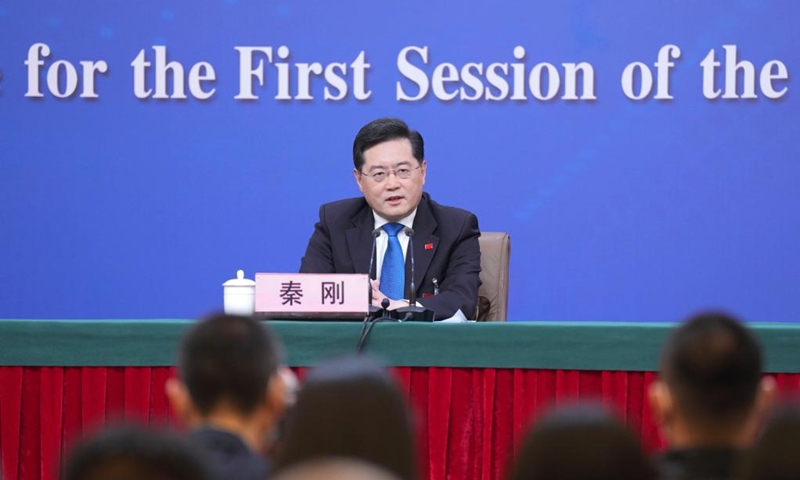
Chinese Foreign Minister Qin Gang attends a press conference on China's foreign policy and foreign relations on the sidelines of the first session of the 14th National People's Congress (NPC) in Beijing, capital of China, March 7, 2023. Photo: Xinhua
After the successfully brokered deal between decades-old rivalries Iran and Saudi Arabia that saw the restoration of ties in March, China is continuing its reconciliation efforts in the Middle East in settling the Yemen crisis and promoting Israel-Palestine peace talks.
China's rising influence in global governance is in stark contrast to a decline in that of the US, whose claims of promoting peace serve only its own selfish interests which eventually resulted in greater rifts between civilizations in the region.
Chinese State Councilor and Foreign Minister Qin Gang on Monday said that China encourages both Israel and Palestine to show political courage and take steps to resume peace talks, and China is ready to provide convenience for this, he noted in a phone call with Israeli Foreign Minister Eli Cohen.
Qin said China is concerned about the current tension between Israel and Palestine, and the current priority is to bring the situation under control and prevent the conflict from escalating or even getting out of control.
"It is never too late to do the right thing," the Chinese foreign minister said, adding that all parties should remain calm and restrained, and stop excessive and provocative words and deeds. The fundamental way out is to resume peace talks and implement the "two-state solution."
Also on Monday, Geng Shuang, China's deputy permanent representative to the United Nations, said that the political process in Yemen has maintained good momentum, and China welcomes all parties concerned maintaining communication on the resumption of the truce.
Saudi Arabia, Oman and other regional countries are making positive efforts to ease the situation in Yemen and achieve a permanent cease-fire, Geng noted.
The Chinese envoy said that the resumption of diplomatic ties between Saudi Arabia and Iran is of great significance for strengthening regional solidarity and cooperation and easing regional tensions. It has also set a good example for dialogue and consultation, and served as excellent practice for promoting the China-proposed Global Security Initiative.
China's role in mediating conflicts in the region is constructive and unique, as China not only provides a platform for dialogue with a full range of resources but also a moderate and pluralistic atmosphere for the talks, experts said.
China's mediating role is highlighted in a number of factors. For one thing, China's proposal of the Global Security Initiative, Global Development Initiative and Global Security Initiative as well as the concept of building a global community of a shared future, which advocates a multipolar world, are more in line with the values of Middle East countries.
In terms of practical actions, China has shown an objective and neutral stance on international hot-button issues, including those in the Middle East, on the Afghanistan issue, and on the Russia-Ukraine conflict, Zhu Yongbiao, director of the Center for Afghanistan Studies at Lanzhou University, told the Global Times on Tuesday.
In addition, the current complex international situation, with rising tensions and risks, has given countries in the region the anxieties and eagerness to seek stability and development, Zhu noted.
The talks come at a time of rising tensions in the region. In Israel, clashes at the al-Aqsa mosque in Jerusalem earlier this month drew condemnation from Arab countries. Saudi Arabia, with whom Israel hopes to normalize ties, said Israel's "storming" of al-Aqsa undermined peace efforts, the Guardian reported.
The overlapping of Ramadan and Passover this April has increased the possibility of friction as Jerusalem hosts an unusually large influx of pilgrims. More people are worried that the latest clashes could ignite a powder keg in the region and block the road to peace and stability.
The Israeli-Palestinian conflict is a multi-faceted and complex issue, but the biggest obstacle to peace talks at present is that some Israeli politicians still do not want to change their hard-line attitude toward the Palestinians and are unwilling to see its dominant position fade, while the US is fanning the flames to exacerbate the conflict, observers noted.
In contrast to China's reconciliation efforts, US claims of "returning peace to the Middle East" is more of a lip service that serves its geopolitical goals, Zhu said.
"In a way, the US indeed wants to achieve peace in the region, but the premise is that such 'peace' must be the one that serves its own interests. The US dominance in the region, highlighting monopoly and exclusion, is based on the interests of its own and its allies, while ignoring the legitimate and rightful interests of other parties. The selfish acts only made things worse, further widening the rift between civilizations in the region," the expert noted.




